Best bass guitar picks 2025: our pick of perfect plectrums for bass players
From extra heavy acrylic picks to surprisingly slim signature options by Dunlop, Ernie Ball, D’Addario and more
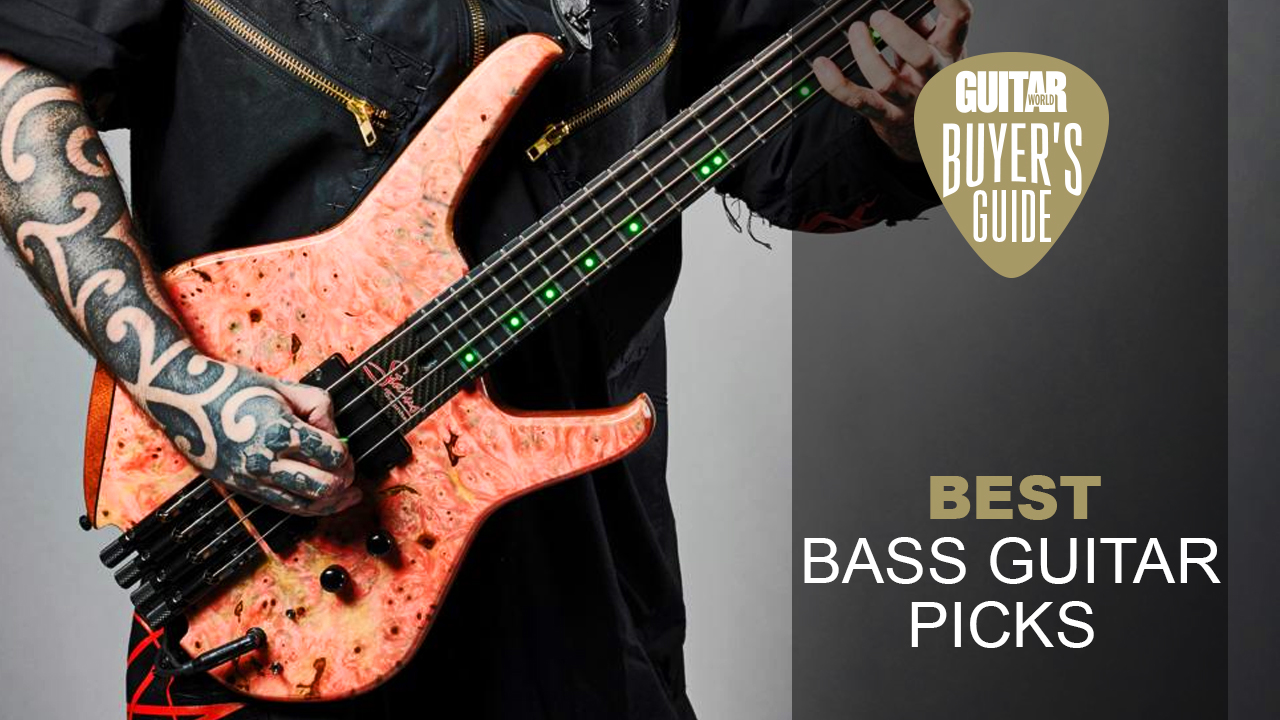
The plectrum is probably the most overlooked part of your set-up – usually the last thing anyone thinks about. After all, if Paul McCartney can use flattened pennies, won’t anything do? Well, we’re here to tell you that, with a bit of thought, the best bass guitar picks can significantly enhance your playing and even your tone.
Ask most players about bass picks and they’ll say thicker is better. While that’s partly true – since bass strings are much thicker than guitar strings – there are benefits to using thinner picks too. Thick picks offer more attack and durability, but thinner, more nimble picks can help you glide through bass runs with greater speed and less resistance.
Don’t get us wrong, the plectrum you like to use is largely down to personal preference. If you are just starting out, there is no substitute for buying a bunch of different picks, trying them out, and ultimately deciding what works best for you. However, this article is designed to help you whittle down the cornucopia of choice and help put you in the correct ballpark.
On the other hand, if you are a seasoned player, experimenting with different bass picks can push you into new playing styles and expand your repertoire. It is always a good idea to have a variety of picks on hand, exploring different materials, gauges and shapes to keep things fresh. Keep reading to discover the best options on the market from brands like Ernie Ball, D’Addario and Dunlop.
Our top picks
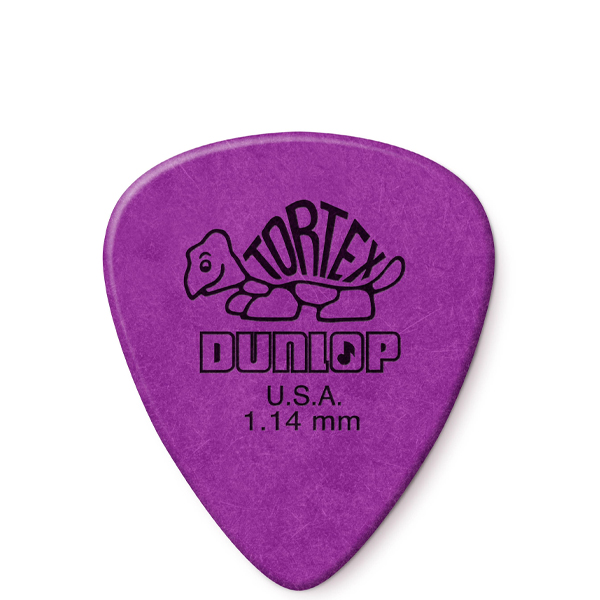
This staple offers everything a bass player might need in a plectrum. The treated Delrin material is not only durable but also features a unique, almost powdery finish that provides a fantastic grip. The coating is unobtrusive and does an excellent job of staying secure in your fingers.
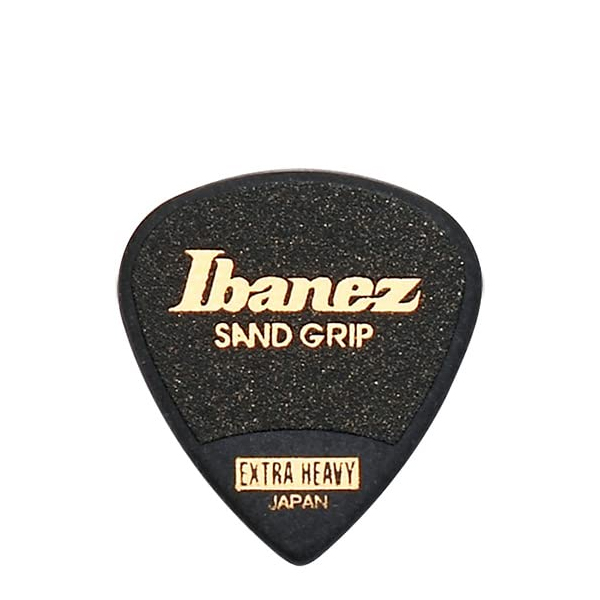
The Grip Wizard Series plectrums do exactly what their name suggests. Ibanez has finished these picks with sand on both sides for ultimate grip. If you tend to drop a plectrum mid-set, this is the option for you. It clings remarkably well to your fingers, and the only way it will leave your hand is if you put it down.
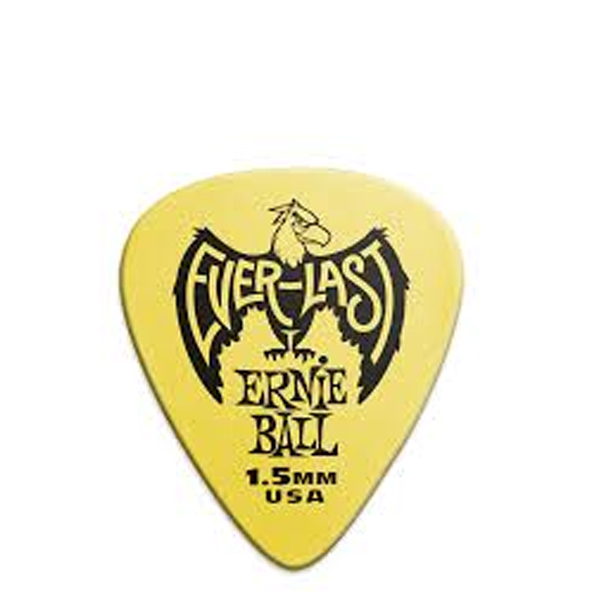
In terms of material, Ernie Ball sticks with what works: Delrin. It’s durable and responsive, and the non-slip matte finish on the Everlast picks provides a suitably grippy surface – no problems there. While the rounded tip might not be the best choice for ultra-fast runs, it helps produce a warm bass tone with a softer attack.
Best overall
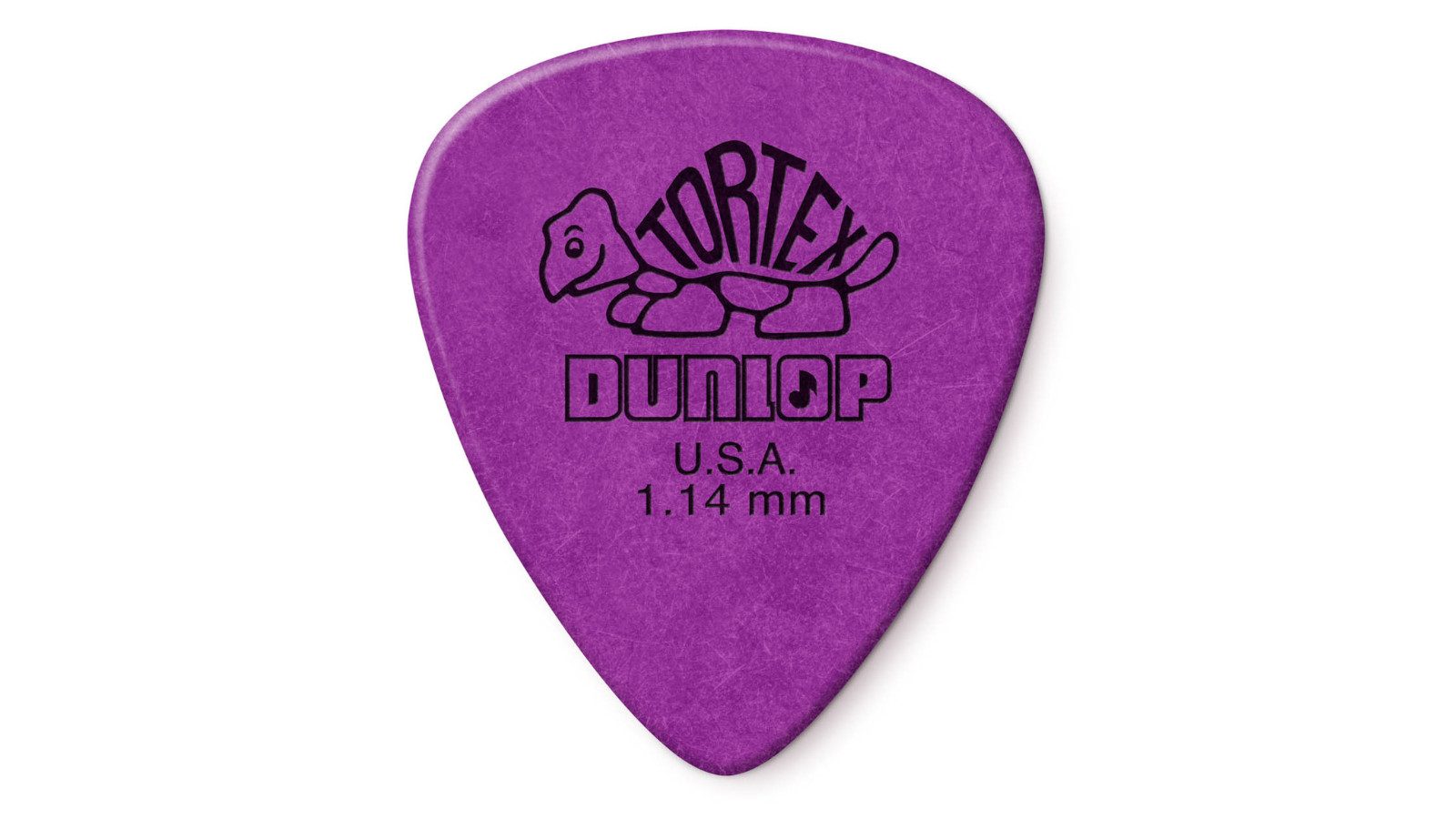
1. Jim Dunlop Tortex Standard
Our expert review:
Specifications
Reasons to buy
Reasons to avoid
You’ll be hard-pressed to find a guitar store worldwide that doesn’t have Jim Dunlop’s color-coded Tortex plectrums hanging on the slat wall – and with good reason. Since its inception in 1981, the Tortex has been an industry standard, with bass players flocking to it from day one, and the popular little turtle doesn’t look like it’s going anywhere anytime soon.
This staple offers everything a bass player might need in a plectrum. The treated Delrin material is not only durable but also features a unique, almost powdery finish that provides a fantastic grip. The coating is unobtrusive and does an excellent job of staying secure in your fingers.
There’s a wide range of gauges available, but the 1.14mm stands out for bass players. It’s the perfect “Goldilocks” gauge – not too thick or thin, just right. This thickness is ideal for digging into the strings while still allowing for relatively smooth resistance during fast alternate picking. Plus, you won’t have to worry about the 1.14mm breaking easily under hours of heavy use, making it the best bass pick overall.
Best for grip
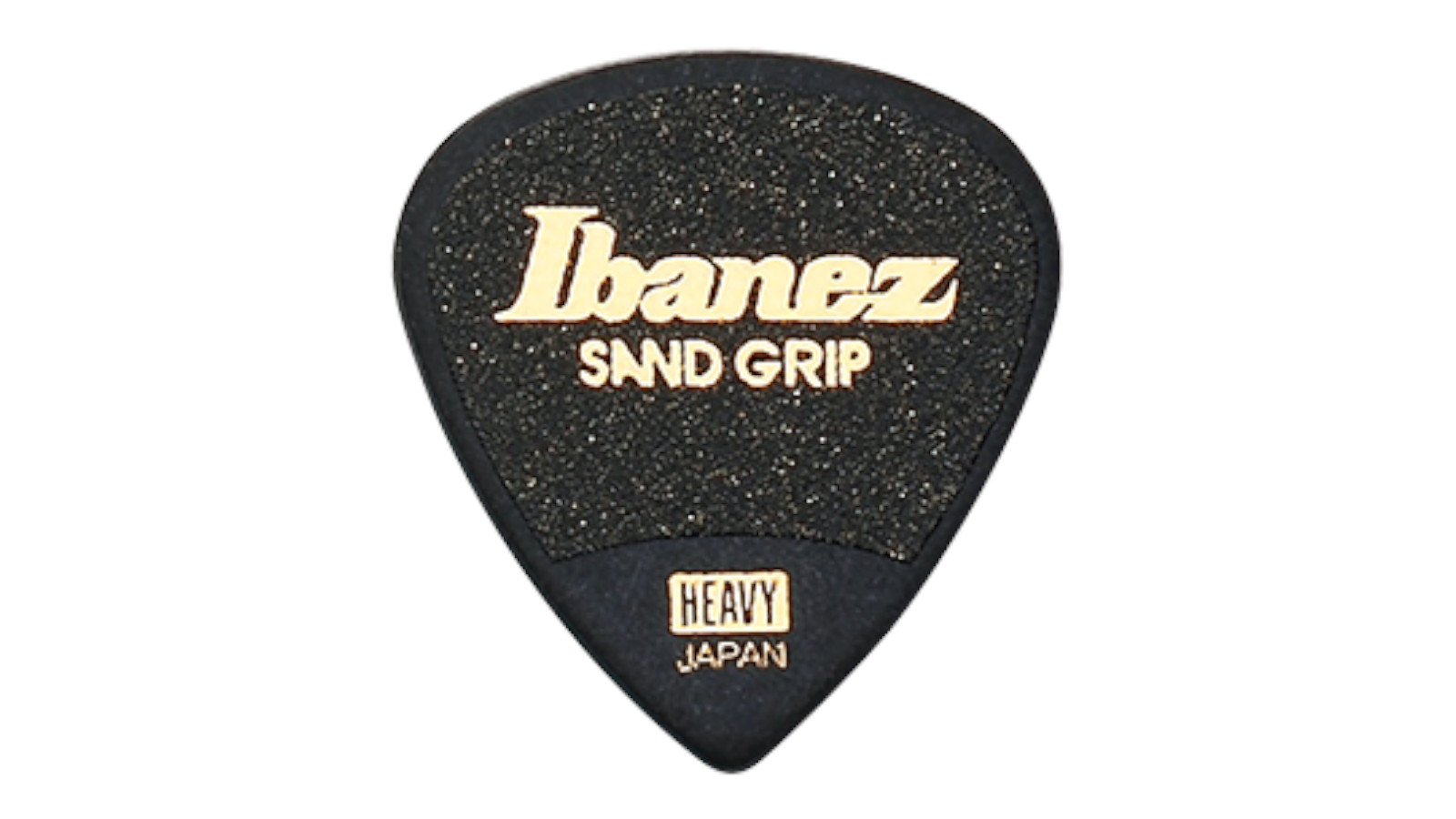
2. Ibanez PA16 Grip Wizard Series Sand Grip
Our expert review:
Specifications
Reasons to buy
Reasons to avoid
For years, Japanese brand Ibanez has been renowned for producing a wide variety of bass guitars, from cutting-edge active shred machines to semi-hollow short-scale models that deliver upright tones. With such a rich heritage, it’s no surprise that it also produce stellar bass picks to complement its instruments.
The Grip Wizard Series plectrums do exactly what their name suggests. Ibanez has finished these picks with sand on both sides for ultimate grip. If you tend to drop a plectrum mid-set, this is the option for you. It clings remarkably well to your fingers, and the only way it will leave your hand is if you put it down.
The teardrop shape is smaller than a standard plectrum but slightly larger than a Jazz III. Its compact size allows you to get close to the strings for controlled and speedy playing when needed. There are three gauges available – 0.8mm, 1.0mm, and 1.2mm – which cover a lot of ground, but those who prefer thinner gauges may find fewer options.
Best variety
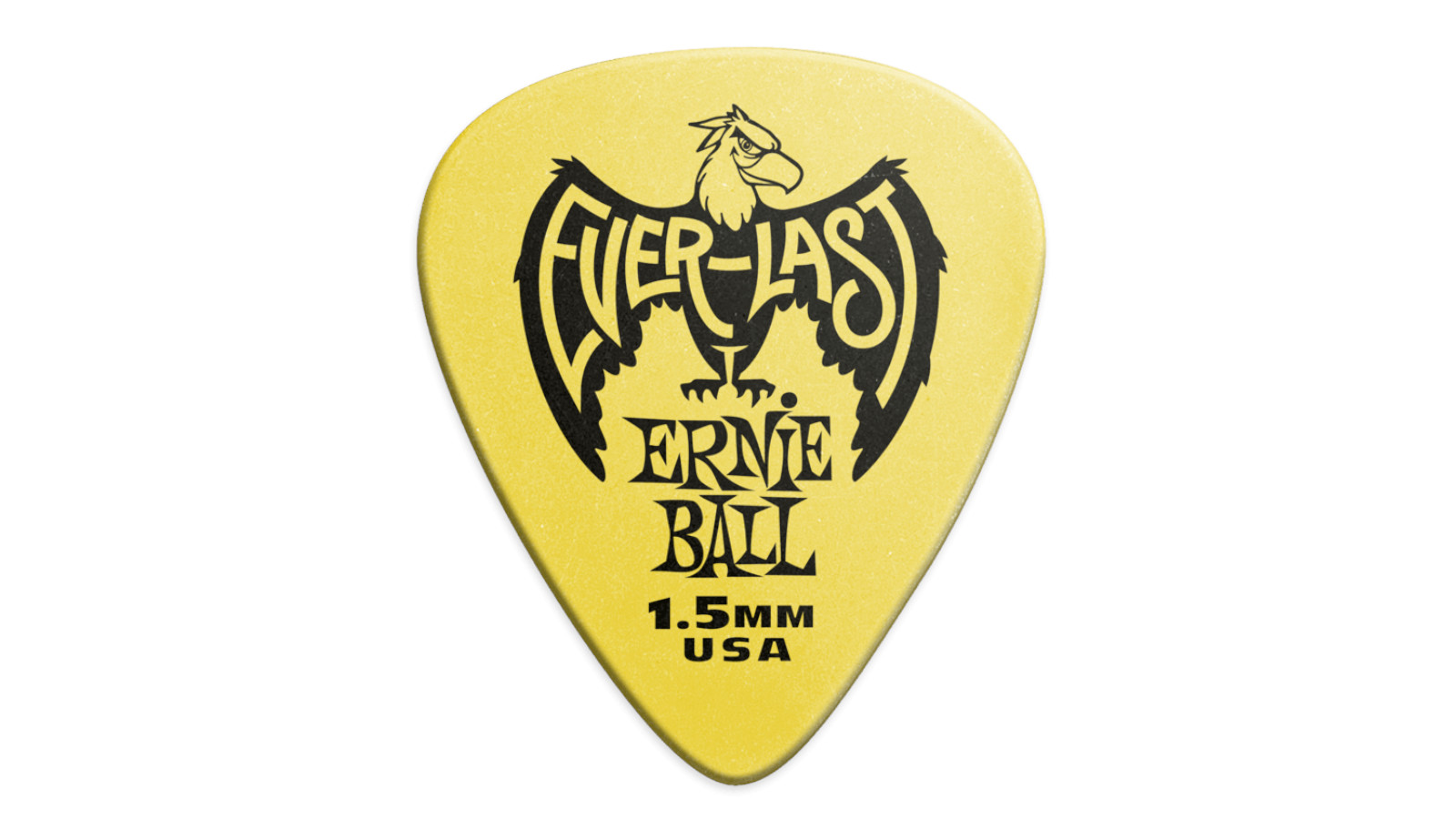
3. Ernie Ball Everlast
Our expert review:
Specifications
Reasons to buy
Reasons to avoid
The eagle has landed in the plectrum game, and just like its Slinky string range, Ernie Ball is onto a winner with the Everlast picks. Also similar to the Slinky strings, these picks are color-coded to indicate the gauge, matching the corresponding string pack. Pretty handy, right? Especially when you drop your pick on the floor at your desk or during a gig, as they are very bright.
In terms of material, Ernie Ball sticks with what works: Delrin. It’s durable and responsive, and the non-slip matte finish on the Everlast picks provides a suitably grippy surface – no problems there. While the rounded tip might not be the best choice for ultra-fast runs, it helps produce a warm bass tone with a softer attack.
There’s also a variety of gauges to choose from, ranging from a very heavy 2.0mm for minimal flex to a thinner 0.6mm for less resistance when chugging out quick notes. Overall, the Ernie Ball Everlast is a durable yet versatile solution for a plethora of playing styles.
Best for punk
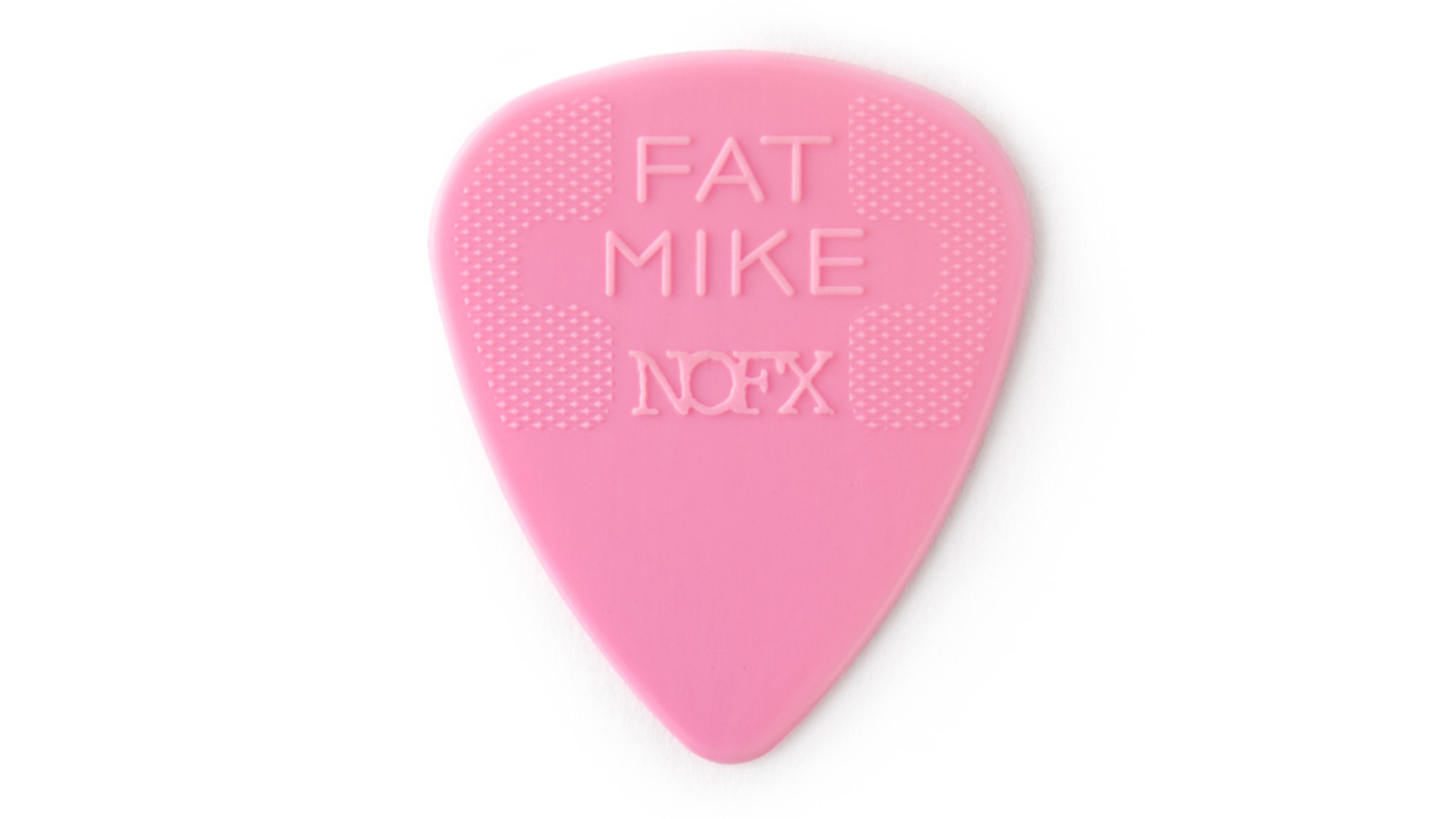
4. Jim Dunlop Fat Mike Custom Nylon Signature
Our expert review:
Specifications
Reasons to buy
Reasons to avoid
NOFX lead vocalist and bassist Michael John Burkett – better known as Fat Mike – has been churning out catchy bass riffs with the punk-rock outfit since 1983. A seasoned bass slinger, he’s earned himself a signature plectrum by Jim Dunlop. Surprisingly, it’s not a heavy, hard material for extra attack that he opts for, but rather a 0.6mm nylon pick.
Sure, 0.6mm is on the thinner side, but nylon is also a highly flexible material, much less rigid than something like Delrin. This flexibility makes it easier to push through the strings for fast licks, providing extra bounce. It might seem counterintuitive, but bass heavyweights like Mark Hoppus and Matt Freeman are also fans of a thinner gauge.
Like standard nylon Dunlop plectrums, Mike’s signature pick offers a bit of grip on both sides. It also features NOFX branding, a nice touch for any die-hard fans. The bright pink color not only stands out but makes it easier to spot if you happen to drop it.
Best for leverage
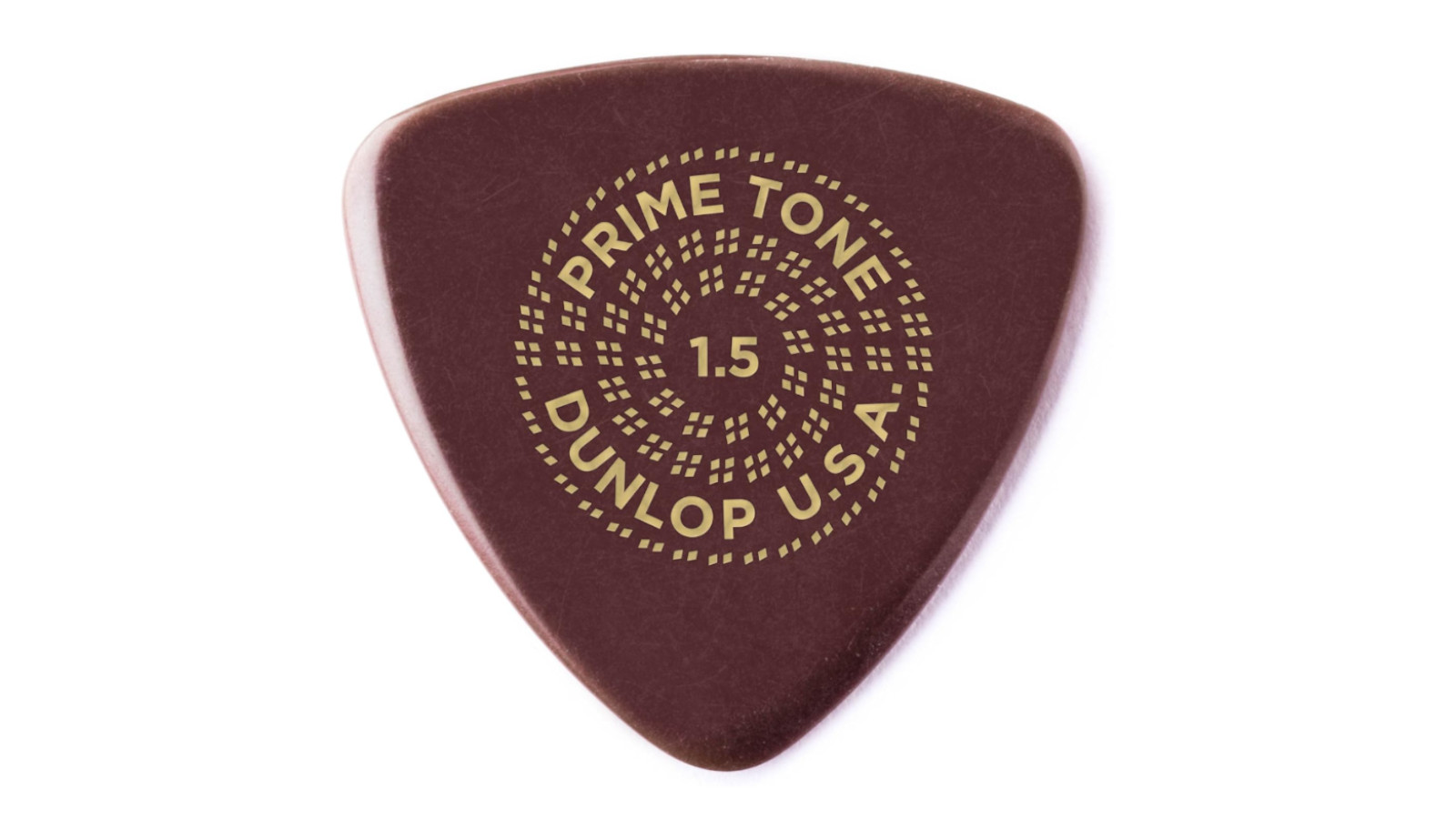
5. Jim Dunlop Primetone Small Triangle
Our expert review:
Specifications
Reasons to buy
Reasons to avoid
Dunlop is one of the most recognizable brands in the plectrum game, and its experience and care are especially evident in the Primetone series. Made in the USA, these plectrums are hand-burnished, giving them a glossy finish that allows them to glide off strings with ease. Each pack comes with a signature by the person who has finished the pick, a nice touch from Dunlop.
The sculpted edges enhance the Primetone’s ability to glide off bass strings, enabling expressive and quick playing. Available only in heavier gauges, the combination of sculpted edges and glossy finish allows the Primetone plectrums to move through strings with minimal resistance – something not typically experienced with these kinds of gauges.
Constructed from Ultex, the Primetone picks are incredibly durable and produce a bright, articulate tone that’s perfect for tight, syncopated funk bass lines. Additionally, the triangular shape of these picks enhances grip and provides leverage for digging in when needed.
Best value
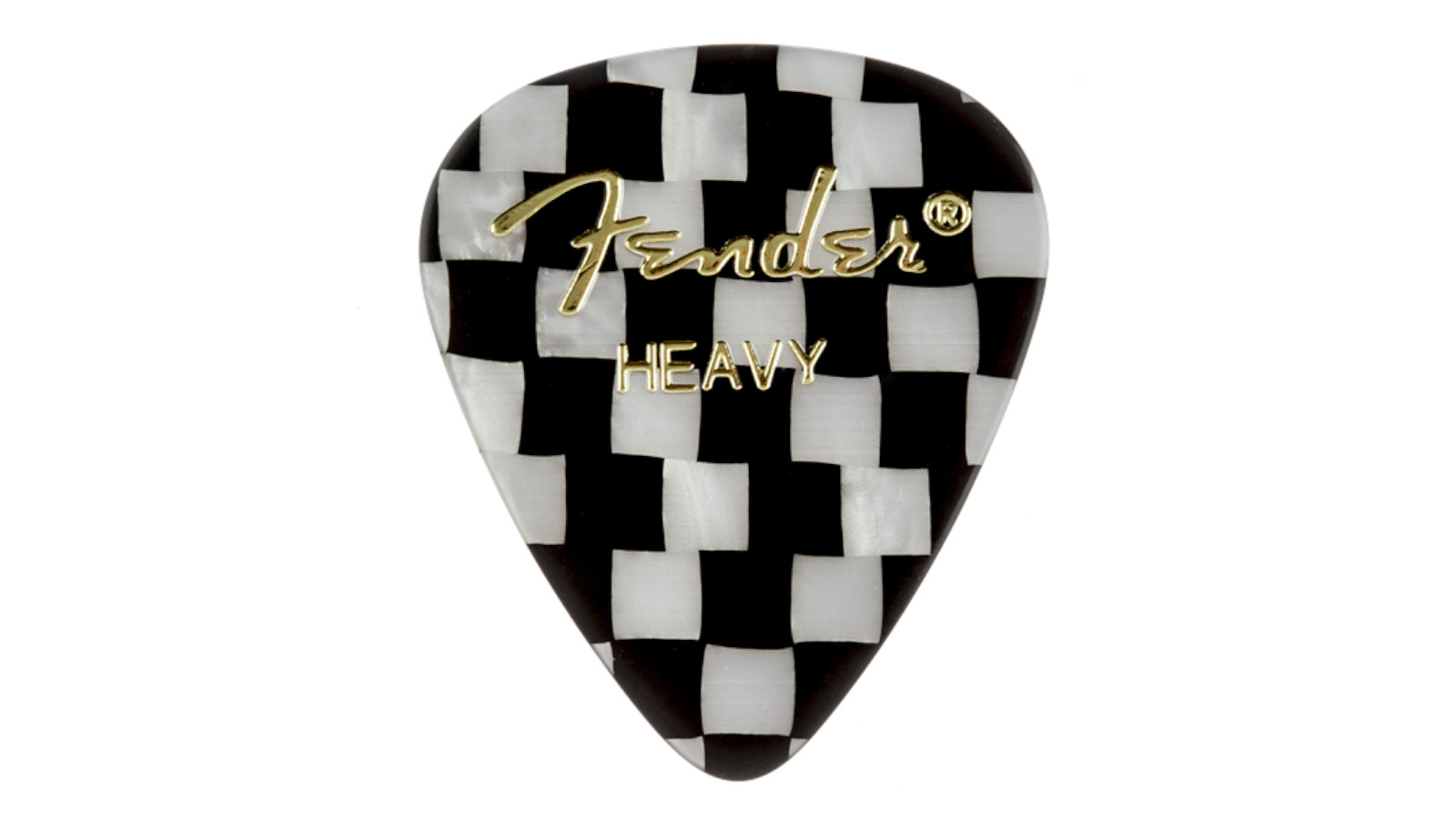
6. Fender 351 Checker Picks
Our expert review:
Specifications
Reasons to buy
Reasons to avoid
If you ask anyone on the street to draw a guitar, they’d probably sketch a Stratocaster. Ask them to draw a bass guitar pick, and they’re likely to depict the shape of the classic 351 plectrum. This timeless shape, with its rounded tip, is a crowd-pleaser that appeals to a wide variety of players.
Available in three gauges – thin, medium, and heavy – these picks cater to most playing styles. The heavy gauge can withstand the rigors of heavy bass strings, while the thin and medium gauges are preferred by faster players.
Made from celluloid, these picks offer a bit of flexibility without being overly rigid, providing a balanced tone. The surface is smooth but not too slippery; however, if you find it challenging to keep hold of a pick while playing, you might want to consider one with more grip. And let’s talk about the finish – it’s fantastic! The checkerboard design pairs beautifully with the gold Fender logo, making it a perfect fit for any ska band.
Best for thickness
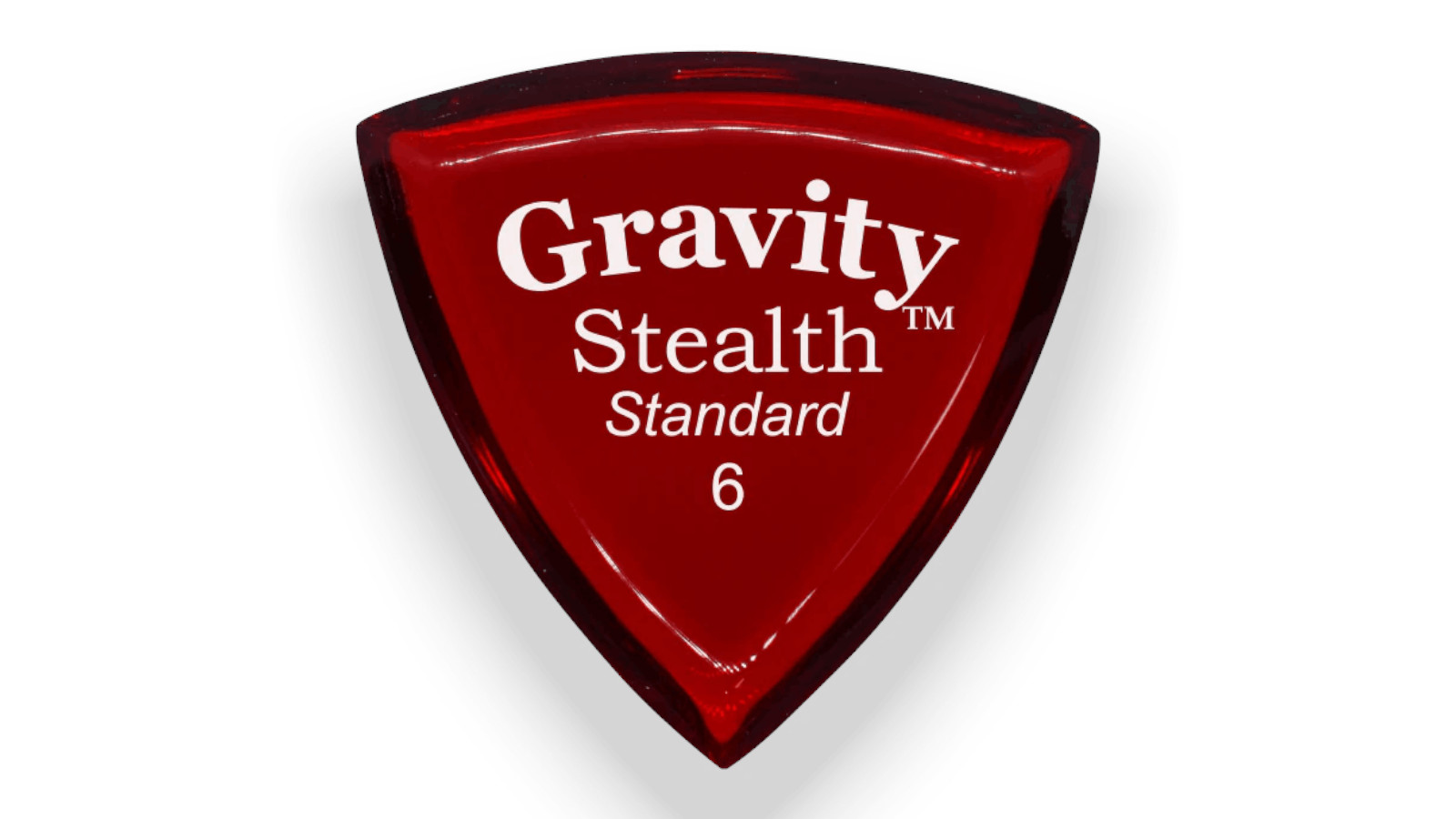
7. Gravity Stealth Standard
Our expert review:
Specifications
Reasons to buy
Reasons to avoid
Gravity has been experiencing a notable ascendancy in recent years, largely thanks to collaborations with brands like JHS and Rob Chapman. But is all this hype worth it for bass players? Frankly, yes – especially when it comes to its Stealth Standard picks, which are available in a variety of heavy-gauge options.
Made from acrylic, these Gravity picks are incredibly durable and have a remarkable impact on tone largely due to their stiffness. You’ll notice a significant increase in volume and brightness while using Gravity plectrums, making them ideal for players who appreciate that extra oomph.
However, be aware that Gravity plectrums come with a premium price tag, so you might hesitate to take them gigging or to a sticky-fingered friend's house. That said, there's no denying the premium feel of these picks. They are available in either hand-polished or master-finished options. The former offers a smooth glide over the strings whilst the latter has rougher edges for digging in.
The identical-tip 'tri-tip' design also adds versatility, meaning that if you drop the pick mid-set, picking it up from the floor is less of a gamble in terms of getting it the right way round.
Best for tone
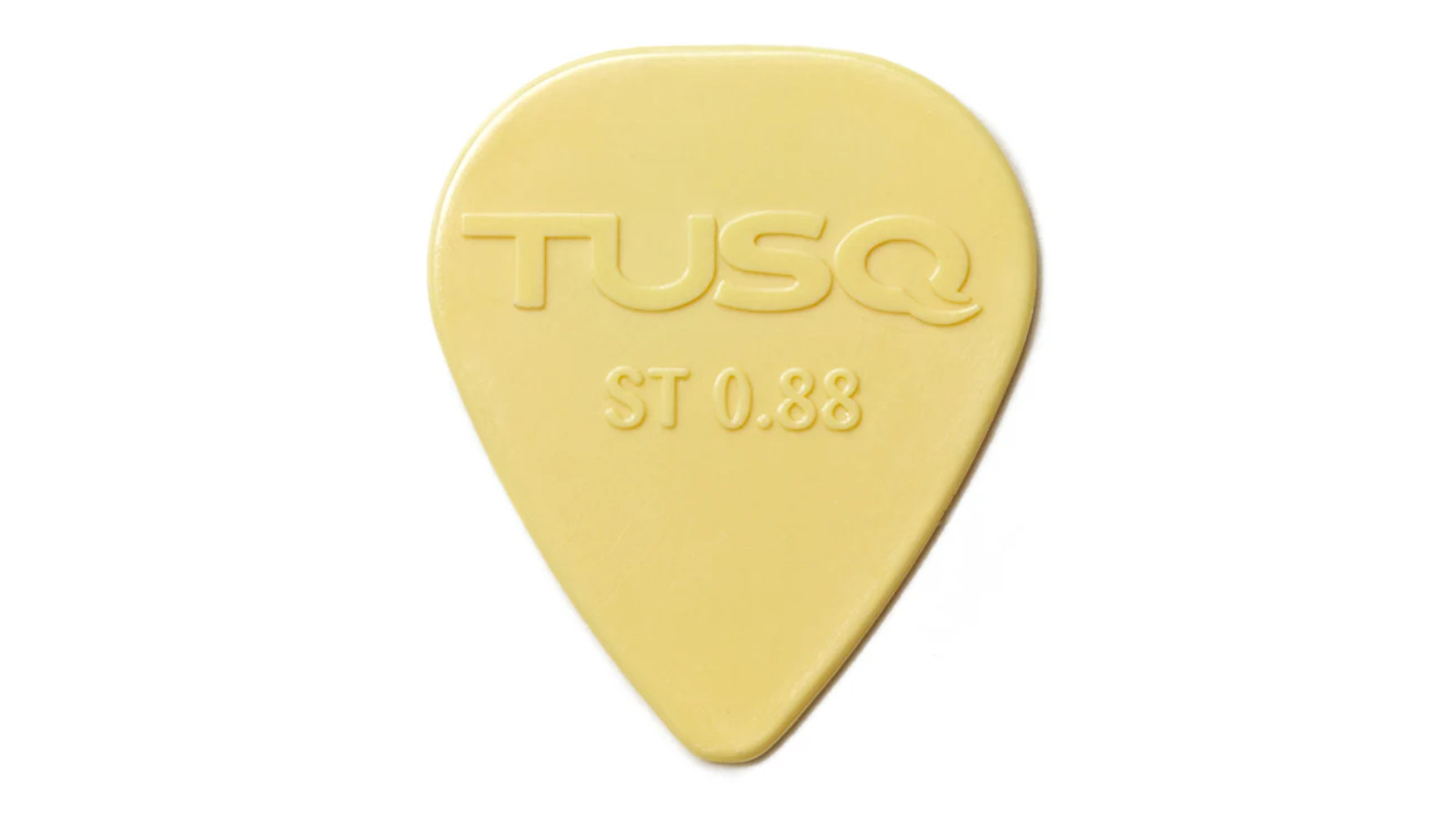
8. Graph Tech TUSQ Standard
Our expert review:
Specifications
Reasons to buy
Reasons to avoid
Graph Tech is best known for its TUSQ composite nuts, which are used by most guitar brands worldwide. However, it's also got a few other tricks up its sleeve, like these fantastic plectrums. Available in three tone profiles – bright, warm, and deep – Graph Tech claims its picks can enhance your tone. After using a TUSQ standard for a while, we can honestly say that while the difference is subtle, it’s definitely there.
TUSQ picks achieve this by replicating the characteristics of tortoise shell and using a high stiffness-to-thickness ratio in these picks. The composite material, the same as that used in its nuts, feels comfortable in hand and provides an articulate attack.
We particularly enjoy the warm option for bass, especially for smooth soul and R&B lines. But if that’s not your vibe, the bright and deep options are worth checking out. Our only complaint is the limited gauge selection; a few more options would appeal to a wider range of bassists.
FAQ

What gauge is best for bass picks?
You can trust Guitar World
Ultimately, the best gauge – also known as thickness – of a bass pick will depend on your playing style and technique. The most common bass picks are typically heavier, with gauges like 1.0mm, 1.5mm, or 2.0mm being popular choices among bassists. Since bass strings are thicker than standard guitar strings, a thicker pick tends to last longer, offers more durability, and provides a more pronounced attack when striking those heavy bass strings. A thicker plectrum also grips the bass strings better, producing more volume when you dig in.
However, this isn’t a hard-and-fast rule. Plenty of bass players prefer thinner picks. Thin picks are usually classified between 0.5mm and 0.73mm. Fat Mike, Mark Hoppus and Matt Freeman are all said to use 0.6mm plectrums, which are much thinner than you might expect from those kinds of players. Thinner gauges are great for fast playing because they offer less resistance, allowing you to push through the strings more easily, making for more efficient motion.
Your best bet is to experiment with different picks and see what suits your style and genre. Not every pick will give the same results, so it’s handy to have a variety on hand when you practice.
What material is best for bass picks?
There are many different materials manufacturers use to create bass plectrums, each with its own qualities that might appeal to you. Here’s a quick rundown of what different materials offer.
Delrin: Perhaps the most common, Delrin is a stiff plastic that doesn’t have much flex. Also known as acetal, this material offers plenty of bite and produces a bright tone.
Celluloid: Softer than hard plastics like Delrin, celluloid picks tend to wear down faster on bass strings. They feel soft and flexible and were the first alternative to tortoise shell.
Nylon: Like celluloid, nylon is soft and flexible. Nylon picks are popular among bassists who play fast, as there’s less resistance against the strings, allowing for easier movement.
Acrylic: This material is one of the thickest and stiffest. Tonally, acrylic is very bright and has a sharper attack compared to nylon. Acrylic plectrums can also be very thick, so if you prefer a chunky feel, this is the way to go.
What bass pick shape is the best?
Like the materials used, bass picks come in a variety of shapes. The most traditional is the teardrop, featuring a slightly rounded tip that's incredibly versatile across different playing styles. It allows for relatively fast alternate picking, though it may not be as precise as a sharp-pointed pick. The gripped end of the teardrop plectrum is very comfortable – neither too wide to be clumsy nor too short to control.
A rounded pick is exactly as it sounds, with a smooth, circular tip. This shape produces a warmer tone with a subtle attack. Triangular picks, on the other hand, offer three identical tips, making them handy if you switch picks frequently during a set. They provide the largest grip area, so if you often drop plectrums or find smaller picks tricky to control, a triangular pick might be your best option.
How we choose
Here at Guitar World, we are experts in our field, with many years of playing and product testing between us. We live and breathe everything guitar related, and we draw on this knowledge and experience of using products in live, recording and rehearsal scenarios when selecting the products for our guides.
When choosing what we believe to be the best bass guitar picks available right now, we combine our hands-on experience, user reviews and testimonies and engage in lengthy discussions with our editorial colleagues to reach a consensus about the top products in any given category.
First and foremost, we are guitarists, and we want other players to find the right product for them. So we take into careful consideration everything from budget to feature set, ease of use and durability to come up with a list of what we can safely say are the best bass guitar picks on the market right now.
Read more about our rating system, how we choose the gear we feature, and exactly how we test each product.
Related buyer's guides
- Best budget bass guitars: our top picks under $500
- Our pick of the best 5-string bass guitars
- Enhance your sound with the best bass effects pedals
- Work on your chops with the best bass amps for practice
- Here is our pick of the best gifts for bass players
Get The Pick Newsletter
All the latest guitar news, interviews, lessons, reviews, deals and more, direct to your inbox!
Ross has been a music lover and guitar player since the age of 8. He has spent the five years since graduating from university working in music retail, selling guitars, amps and more. Ross is particularly interested in electric guitars, pedals and amplifiers and his current rig includes a trusty 2009 American Standard Stratocaster and Vox AC30S1 with a few Walrus Audio and Way Huge pedals in between.
“An esoteric boutique vibe, superb ergonomics and a powerful, unique preamp – Tobias is back”: Tobias Growler IV review
“Affordable versions of the three best basses I've ever held in my hands”: Sterling by Music Man completes its trilogy of Joe Dart signature models with a trio of made-to-order basses that cost less than $500

